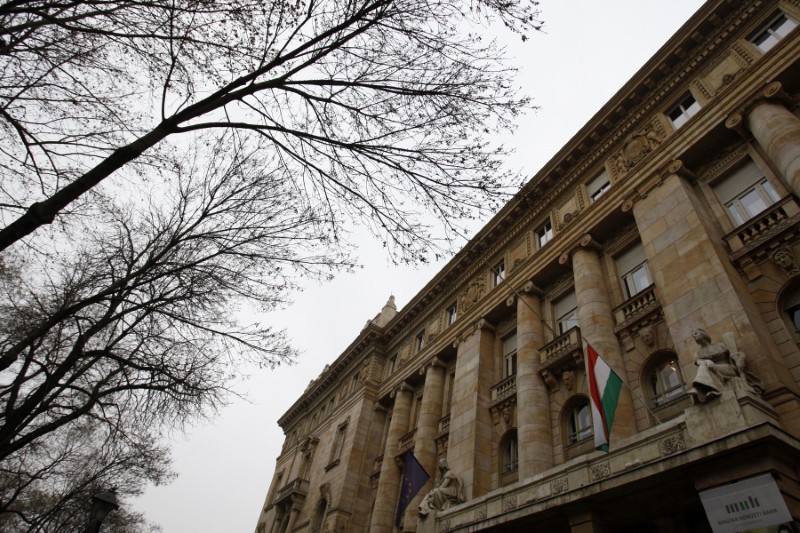By Krisztina Than
BUDAPEST (Reuters) - Mounting labor shortages and surging wages across Central Europe are nudging inflation higher, prompting some central banks in the fast-growing region to tighten policy after years of monetary easing.
The Czech central bank already delivered a first small rate hike in August and markets expect a further increase next month, with unemployment at an all-time low of 3.8 percent and inflation the fastest in five years.
The Polish and Romanian central banks are also forecast to start raising interest rates next year, especially if the European Central Bank soon scales back its bond purchase program and starts tightening policy as expected. [nL8N1MK3UD]
The outlier in the eastern corner of the European Union is the National Bank of Hungary, which has pledged to keep its base rate unchanged at a record low 0.9 percent until at least 2020 - and even flagged further possible easing.
The bank, run by a strong ally of Prime Minister Viktor Orban who faces elections in 2018, will wait until the last possible moment to take borrowing rates higher as boosting growth is an important government target.
Besides, the forint has firmed to 5-week highs against the euro this week, helped by Hungary's good economic outlook.
Many investors believe the central bank wants to avoid excessive forint gains even though it has denied targeting the exchange rate.
"I believe the NBH is trying to buy time and its goal is to somehow stay behind the ECB (tightening curve)," said Gyula Mark Pleschinger, head of treasury sales at MKB Bank in Budapest.
"The big question is how long the credibility of the NBH's communication can be maintained when possibly next year European QE stops, and we will start talking about tightening."
The Hungarian bank cut its overnight rate further into negative territory in September and said it was ready to loosen monetary policy further with unconventional, targeted tools to drive longer government bond yields lower.
Deputy governor Marton Nagy said on Friday that the 3-month BUBOR interbank market rate could stay at its current levels near zero until early 2019 and real interest rates -- adjusted for inflation -- could "stay negative for the next seven years."
The bank sees inflation reaching its target of 3 percent, plus or minus 1 percentage point, only in 2019. Headline annual inflation was at 2.5 percent in September.
But more wage hikes are coming and the NBH's laid-back approach carries certain risks, analysts said.
"If inflation were to turn soft again, the forint should be stable; but (Czech) rate hikes will result in sharp Czech crown appreciation," Commerzbank (DE:CBKG) said in a note.
"If inflation were to accelerate, (the crown) should be stable, but the forint could depreciate sharply."
TIGHTENING ON THE WAY
In Central European economies, years of heavy emigration to western Europe and falling unemployment have created labor shortages that make it tough for businesses of all kinds to recruit. This has driven up wages sharply. [nL8N1C30HM]
In Romania, the central bank has flagged upside risks to inflation and in effect began tightening monetary conditions earlier this month by narrowing the interest rate corridor.
As the budget deficit widens and wages continue to grow, the bank is expected to start hiking its 1.75 percent rate next year, lifting it to 2.0-3.5 percent by the end of 2018, according to a Reuters poll.
In Poland, mounting labor shortages are also seen intensifying price pressures via rising wages down the line, some analysts said.
Consumer inflation accelerated to a 7-month high of 2.2 percent in September as corporate sector wages were growing at their fastest pace in more than five years. The Polish central bank targets inflation at 2.5 percent.
Even though its Governor Adam Glapinski has said interest rates should probably stay at their current all-time lows until the end of 2018, markets have priced in a hike over the next 12 months.
Glapinski dismissed worries that rising wages could spark higher inflation, but some analysts do not share this view.
"In the short term wage growth should pick up, which will translate into intensifying price pressures," Nomura said in a note, adding that it expected a total of 100 basis points of rate hikes delivered by end-2019, starting in July 2018.
"If supply-side factors add to inflationary momentum we see risks of an earlier commencement and a larger tightening cycle."
